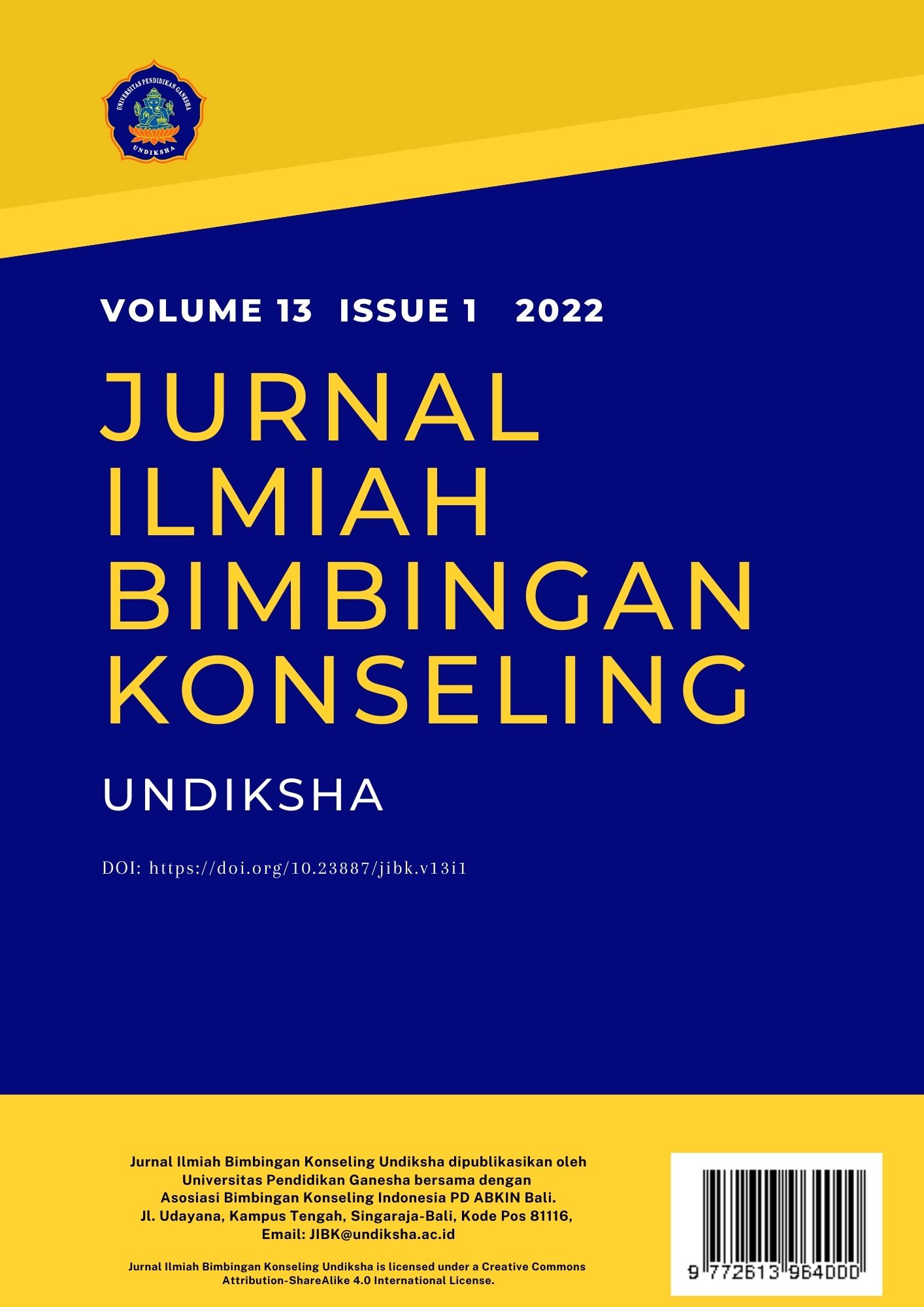Hubungan antara Kecerdasan Emosional dengan Organizational Citizenship Behavior pada Petugas Satuan Polisi Pamong Praja
DOI:
https://doi.org/10.23887/jibk.v13i1.50612Keywords:
Emostional quotient, Organizational behavioral citizenship, Civil service policeAbstract
This study aims to determine the relationship between emotional intelligence and organizational citizenship behavior in civil service police officers. This study uses quantitative methods, the method of collecting data is through surveys. The study population was members of the civil service police unit in the city of Salatiga, Central Java, Indonesia. The sample was determined randomly as many as 34 people. The research data were collected using the emotional intelligence scale and the OCB scale. The analysis was carried out by using the Rank Sperman Rho statistic. The results of the analysis showed that the Spearman's Rho correlation test obtained a correlation coefficient of 0.930; p<0.05. These results indicate that there is a significant positive relationship between emotional intelligence and Organizational Citizenship Behavior (OCB). The results of this study have implications for the formulation of policies regarding the development of the quality of human resources of the civil service police unit.
References
Abraham, R. (1999). The role of job control as a moderator of emotional dissonance and emotional intelligence: outcome relationships. Journal of Psychology 134 (2), 169–184. DOI: https://doi.org/10.1080/00223980009600860
Anggraeni, S. I. (2002). Pengembangan karir sukses individu melalui lingkungan social dan emotional intelligence. Jurnal Akuntansi & Manajemen, 13 (3), 59-70.
Arikunto, S. (2013). Prosedur penelitian suatu pendekatan praktik. Jakarta: Rineka Cipta.
Azwar, S. (2011). Metode penelitian. Yogyakarta: Pustaka Pelajar.
Azwar, S. (2015). Penyusunan skala psikologi edisi 2. Yogyakarta: Pustaka Belajar.
Cooper, C & Sawaf, A. (1999). Executive eq: kecerdasan emosional dalam kepemimpinan dan organisasi. Jakarta: Gramedia Pustaka Utama.
Fiftyana, B., & Sawitri, D. (2018). Hubungan antara kecerdasan emosional dengan organizational citizenship behavior (ocb) pada guru sekolah (sd) negeri di kecamatan banyumanik kota semarang. Jurnal Empati, 7 (1), 397-405. DOI: https://doi.org/10.14710/empati.2018.20256
Goleman, D. (2002). Emotional intelligence. Jakata: Gramedia Pustaka Utama.
Jufrizen, J., Farisi, S., Azhar, M. E., & Daulay, R. (2020). Model empiris organizational citizenship behavior dan kinerja dosen perguruan tinggi swasta di medan. Ekuitas 4(2), 145– 165. DOI: https://doi.org/10.24034/j25485024.y2020.v4.i2.4159
Kannaiah, D & Shanthi, R. (2015). A study on emotional intelligence at work place. European Journal of Business and Management, 7 (24).
Lestari, E & Destiningsih, R. (2020). Analisis kinerja satuan polisi pamong praja (satpol pp) kota magelang dalam penanganan pedagang kaki lima. Jurnal STEI Ekonomi, 29 (2), 78-87. DOI: https://doi.org/10.36406/jemi.v29i2.291
Luxmi. (2017). Impact of emotional intelligence on organization citizenship behaviour: a study among nurses of government and private hospitals in and around chandigarh. Amity Journal of Training and Development, 2 (1), 1-18.
Narayanan, K. (2016). The effect of emotional intelligence on organizational citizenship behavior. Asian Journal of Management Research, 7 (2), 154-169.
Organ, D. W., Podsakoff, P.M., & Mackenzie S.B. (2006). Organizational citizenship behavior: It’s nature, antecedent and consequences. London: Sage Publications. DOI: https://doi.org/10.4135/9781452231082
Robbins, S.P. (2006). Perilaku organisasi edisi lengkap. Jakarta: PT Indeks Kelompok Gramedia.
Robbins & Judge. (2008). Perilaku organisasi. Jakarta: Salemba Empat.
Saphiro, L.E. (2003). Mengajarkan emotional intelligence pada anak. Jakarta : Gramedia.
Sharma, K & Mahajan, P. (2017). Relationship between emotional intelligence and organisational citizenship behaviour among bank employees. Pacific Business Review International, 9 (11), 20-29.
Singh, A., Singh, S., & Singh, A. P. (2017). Trait emotional intelligence, work family culture and organizational citizenship behavior among indian managers. Journal of the Indian Academy of Applied Psychology, 43 (1), 11-19.
Sugiyono. (2011). Metode penelitian kuantitatif, kualitatif dan r&d. Bandung: Alfabeta.
Titisari, P. (2014). Peranan organizational citizenship behavior (ocb) dalam meningkatkan kinerja karyawan. Jember: Mitra Wacana Medi.
Wong, C.S & Kenneth, S. (2002). The effects of leader and follower emotional intelligence on performance and attitude: an exploratory studi. Journal of Leadership Quarterly, 13, 243-274. DOI: https://doi.org/10.1016/S1048-9843(02)00099-1
Downloads
Published
Issue
Section
License
Copyright (c) 2022 Kristin Devi Wulandari, Sutarto Wijono

This work is licensed under a Creative Commons Attribution 4.0 International License.
Jurnal Ilmiah Bimbingan Konseling Undiksha is an Open Access Journal. The authors who publish the manuscript in this journal agree to the following terms:
JIBK is licensed under a Creative Commons Attribution 4.0 International License. This permits anyone to copy, redistribute, remix, transmit and adapt the work provided the original work and source is appropriately cited.
This means:
Jurnal Ilmiah Bimbingan Konseling is licensed under a Creative Commons Attribution 4.0 International License.
(1) Under the CC-BY license, authors retain ownership of the copyright for their article, but authors grant others permission to use the content of publications in JIBK in whole or in part provided that the original work is properly cited. Users (redistributors) of JIBK are required to cite the original source, including the author's names, JIBK as the initial source of publication, year of publication, volume number, issue, and Digital Object Identifier (DOI); (2) The authors are the copyright owner of the article, and the author grants the JIBK held the first publication right.









.png)

.jpg)
